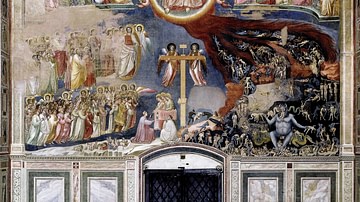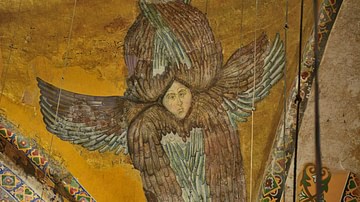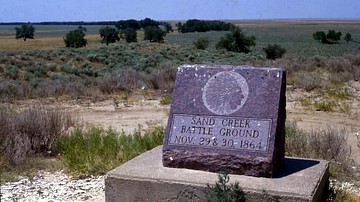Search Articles
Browse Content (p. 26)

Article
Interview: French Fashion during the German Occupation (1940-1944)
In 2024, France is celebrating the 80th anniversary of the Liberation (1944), and as part of a series of conferences organised by the Société archéologique et historique de Beaugency, Catherine Join-Dieterle, Doctor in History of Art and...

Article
Angels in Christianity
Angels in Christianity act as messengers of God, bring good news, and help believers. Their role developed from the function of angels in ancient Judaism but continued to evolve as Christianity became a separate religion. Jewish & Zoroastrian...

Article
Angels in Ancient Judaism
The concept and function of angels in ancient Judaism were some of the many elements incorporated from contemporary cultures and religious views. The Hebrew malakh was translated into the Greek angelos, both of which indicated not their nature...

Article
The Red Eagles
The Red Eagles is a Cheyenne hero tale featuring the popular champion Mok-so-is, the child hero best known from the legend Found in the Grass, popular among many Algonquin-speaking nations including the Cheyenne, Arapaho, and Blackfoot. The...

Article
Found In the Grass
Found In the Grass is a legend of the Algonquian-speaking nations of the Plains Indians and one of the most famous. The story is told in many different versions, but the best-known comes from the Cheyenne and features the child hero Mok-so-is...

Article
Caesarea Maritima's Role in the Roman Empire
Caesarea Maritima, the city Herod the Great (r. 37-4 BCE) built for Rome on the southeastern coast of the Mediterranean served as the Roman Empire's powerbase of operations both commercially and militarily. With Rome's ultimate goal of adding...

Article
Siege of Yorktown
The Siege of Yorktown (28 September to 19 October 1781) was the final major military operation of the American Revolutionary War (1775-1783). It resulted in the surrender of British general Lord Charles Cornwallis, whose army had been trapped...

Article
Arapaho Creation Story
The Arapaho Creation Story is the account of how the world was made from the mud at the bottom of the endless waters by Father (also given as Pipe Person in some versions) with the help of the duck and the turtle. The story is similar to...

Article
The Girl Who Climbed to the Sky
The Girl Who Climbed to the Sky is a folktale from the Arapaho nation about a girl, Sapana, who is tricked by a supernatural sky-being into traveling to his home, where he keeps her, and then must find a way to return to her people, helped...

Article
Early Media Coverage of the Sand Creek Massacre and Continuing Controversy
The earliest reports on the Sand Creek Massacre (29 November 1864) characterized it as a great battle in which the Third Colorado Cavalry under Colonel John Chivington defeated a large force of armed Cheyenne and Arapaho warriors. By the...